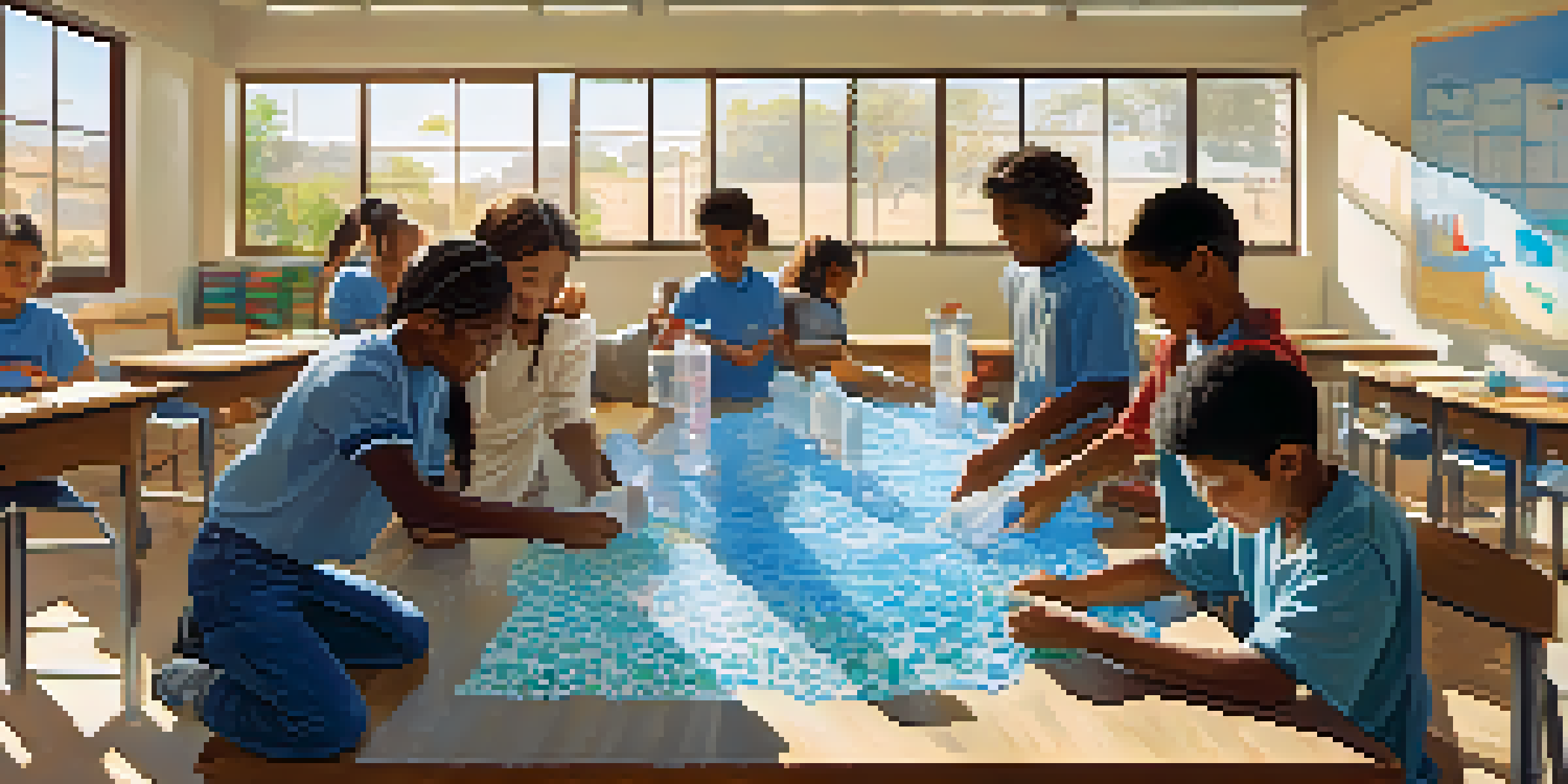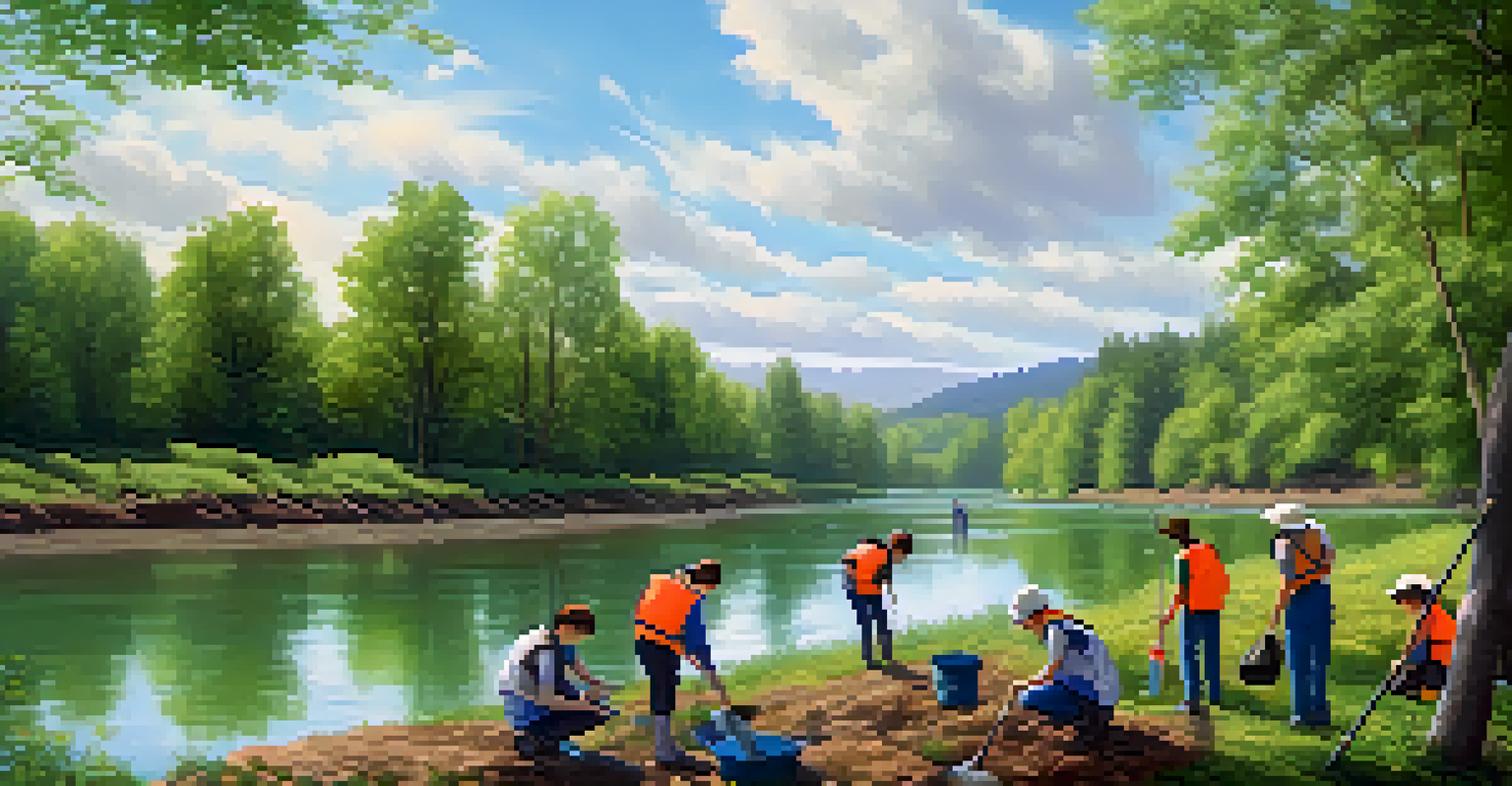The Role of Schools in Promoting Water Conservation Awareness

Understanding Water Conservation and Its Importance
Water conservation refers to the careful management of water resources to prevent waste and ensure sustainability. This practice is crucial in combating the global water crisis, where many regions face severe shortages. By understanding the importance of conserving water, students can appreciate its value and learn practical ways to make a difference in their daily lives.
We never know the worth of water till the well is dry.
For instance, teaching students about the water cycle can help them see how precious this resource is. When they realize that water is a finite resource, they are more likely to adopt water-saving habits. This foundational knowledge sets the stage for a lifelong commitment to conservation.
Moreover, instilling water conservation awareness in students can have a ripple effect. As they share what they've learned with family and friends, they help spread the message further, creating a community that prioritizes sustainable practices.
Curriculum Integration: Making Water Conservation Relevant
Integrating water conservation into the school curriculum can make learning more relevant and engaging. Subjects like science, geography, and even art can provide opportunities to discuss water-related issues. For example, students can explore local water sources in science class and learn about the impact of pollution on these resources.

Hands-on projects, such as creating posters or conducting experiments on water filtration, can deepen their understanding. This approach not only makes the lessons more interactive but also empowers students to think critically about their role in water conservation.
Importance of Water Conservation
Water conservation is essential for sustainability and combating water shortages globally.
When students see the practical implications of their studies, they are more likely to take ownership of their actions. By connecting academic concepts to real-world issues, schools can inspire a generation of environmentally conscious individuals.
Engaging Students Through Extracurricular Activities
Extracurricular activities provide a fantastic platform for promoting water conservation. Clubs focused on environmental awareness can organize campaigns and events that encourage students to participate actively. For instance, a water conservation club could host a 'water week' with activities centered around saving water.
The greatest threat to our planet is the belief that someone else will save it.
These activities might include competitions on who can create the best water-saving device or community clean-up events near local water bodies. Engaging students in such hands-on experiences reinforces the importance of their contributions to conservation efforts.
Moreover, these activities foster a sense of community among students. Working together toward a common goal can strengthen their commitment to sustainability and create lasting friendships based on shared values.
Involving Families: Building a Water-Wise Community
Schools can play a pivotal role in involving families in water conservation efforts. By hosting workshops or sending newsletters home, educators can share practical tips that families can implement. Simple actions like fixing leaks or using water-efficient appliances can drastically reduce water usage at home.
Community events, such as ‘Water Conservation Nights,’ can also invite families to participate in discussions and activities. When families engage together, they reinforce the lessons learned at school and create a more significant impact.
Engaging Students in Learning
Integrating water conservation into the curriculum and extracurricular activities makes learning relevant and empowers students.
This collective effort not only enhances the learning experience for students but also builds a supportive community. When families work together, they can inspire each other and create a culture of water conservation.
Utilizing Technology to Enhance Awareness
In the digital age, technology can be a powerful ally in promoting water conservation awareness. Schools can leverage educational apps and online resources to teach students about water issues. Interactive games and quizzes can make learning fun while imparting essential knowledge about conserving water.
Furthermore, social media platforms can be used to spread awareness and share success stories. Students can post about their water-saving initiatives or challenges, inspiring their peers to join in. This not only creates a sense of accountability but also fosters a community of learners who are passionate about conservation.
By integrating technology into their education, schools can reach a broader audience and engage students in innovative ways. This modern approach can significantly enhance the effectiveness of water conservation campaigns.
Establishing School Policies for Water Conservation
Schools can lead by example by implementing policies that promote water conservation on campus. Simple measures, such as installing low-flow faucets and toilets, can significantly reduce water consumption. Creating a school-wide water usage tracking system can also help students see the direct impact of their efforts.
Moreover, schools can encourage students to participate in setting these policies. By involving them in decision-making processes, they feel more invested in the outcomes. This empowerment can lead to more innovative solutions and a greater commitment to conservation.
Community Involvement Drives Change
Involving families and local organizations in conservation efforts enhances awareness and builds a supportive community.
Establishing these policies not only enhances the school environment but also teaches students about responsibility. When they see the tangible results of their actions, it reinforces the importance of conserving water.
Collaborating with Local Organizations for Greater Impact
Collaboration with local organizations can amplify a school's impact on water conservation. By partnering with environmental groups, schools can access resources, expertise, and support for their initiatives. These partnerships can lead to joint projects, such as river clean-ups or awareness campaigns.
Inviting guest speakers from these organizations to share their knowledge can also enrich students' learning experiences. Hearing from experts can inspire students to take action and understand the broader implications of their choices.

These collaborative efforts not only strengthen community ties but also provide students with a wider perspective on water conservation. Working alongside local organizations helps cultivate a sense of stewardship and responsibility towards their environment.